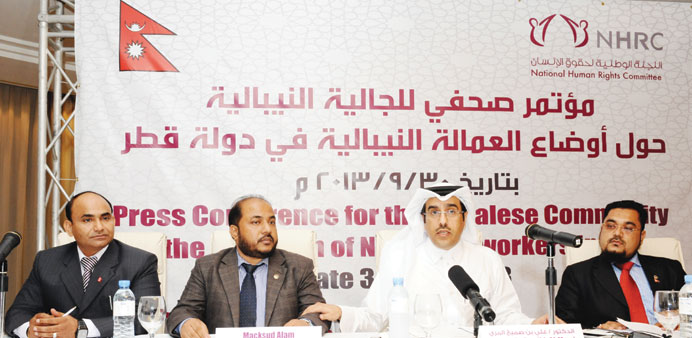By Joseph Varghese
Staff Reporter
|
|
Nepalese community representatives yesterday refuted allegations levelled by London’s Guardian newspaper and some other international media about the “plight” of Nepalese workers in
Qatar.
Speaking at a press conference in the presence of Qatar National Human Rights Committee (NHRC) chairman Dr Ali bin Samikh al-Marri, Maksoud Alam, a Nepalese community representative authorised by the embassy, said: “For the last two weeks, some reports about our community had created a bad reputation for us. We don’t have any problem in living and working in Qatar.”
Mohamed Ramadan, a legal adviser for the Nepalese nationals in Qatar, and Narendra Bahadur Bhat, co-ordinator of Non- Resident Nepalese Association (NARA) Middle East, were present on the occasion.
Al-Marri said the rights body had come to know of the reports published in the Guardian as well as a BBC interview. “NHRC has contacted all related parties on both the Qatari and Nepalese sides to verify and authenticate the number of deaths mentioned in these reports. According to the representatives of the Nepalese community, the real number of causalities had differed greatly from the reports published.”
Al-Marri also stated that as per the official records, the number of Nepalese causalities had declined this year. He said there were around 340,000 Nepalese workers in Qatar and the death rate had a ratio of 3:20,000 due to worksite accidents or other causes.
Comparing the figures of causalities in 2012 and 2013, Ramadan said there had been a significant decline in the number of deaths this year. “In 2012, there were 276 deaths while this year, there have been only 151 so far. Out of this 50% were natural deaths. Work-related deaths accounted for 20% in 2012 and 10% in 2013.”
The other causes of death were traffic accidents (20% in 2012 and 2013) and disputes among workers (10% in 2012 and 20% in 2013).
He urged the media not to use Nepalese workers as a means to achieve their agenda.
Narendra Bhat said the situation of Nepalese workers in Qatar was similar to that in other Gulf countries. “We cannot say that work conditions are ideal; we face challenges regarding salaries, issues of residency and adequate accommodation. But the workers, in general, enjoy legal protection in Qatar.”
Alam said the situation of workers in Qatar had witnessed “significant” improvement since the issue of the new labour law in 2004 and the residence permit law in 2009.
He said the challenges being faced by the Nepalese workers were related to the “incorrect” behaviour of some local companies and some international firms which had no Qatari partner. “Representatives of community bodies are in constant touch with the NHRC and other government bodies in Qatar to find solutions to the challenges faced by the Nepalese workers,” he added.
‘A figment of imagination’
The outgoing Nepalese ambassador Maya Kumari Sharma yesterday denied that she had ever spoken to BBC about the working conditions of her compatriots in Qatar and termed a report in London’s Guardian newspaper on the issue as “a figment of the journalist’s imagination”. Page 10

